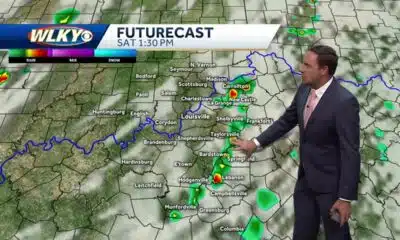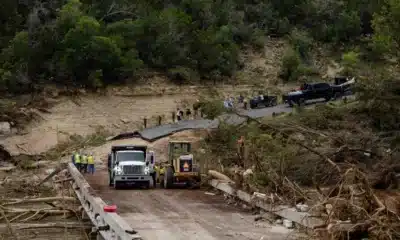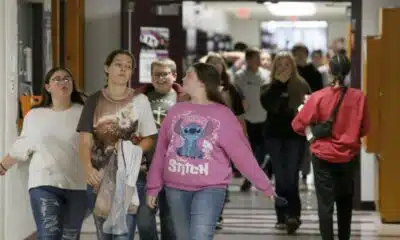News from the South - Virginia News Feed
Virginia Screen-Free Week encourages you to unplug for a bit
by Charlotte Rene Woods, Virginia Mercury
April 14, 2025
Gov. Glenn Youngkin dubbed April 14-19 Virginia Screen-Free Week, which the governor’s administration encourages citizens of all ages to observe by reducing their time on digital devices and increasing activities that promote human connection, physical activity and improved mental health.
Virginia Screen-Free week includes resources and activity guides for parents and children, schools and communities and is an extension of the work Youngkin and lawmakers have undertaken to counter the negative impacts excessive social media and screen time can have on developing minds.
“By reducing distractions and supporting healthier screen use, we are creating space for deeper learning, stronger relationships, and more meaningful engagement—both in and out of the classroom,” Education Secretary Aimee Rogstad Guidera said in a Monday release about Virginia Screen-Free Week .
Lawmakers respond to growing data on youth phone use
A 2023 Gallup survey revealed that teens who spend five or more hours per day on social media apps were more likely to report negative emotions compared to those who use social media less than two hours a day. In response, Youngkin launched initiatives to encourage and enforce time away from phones in classrooms, which the administration said can offer students a few hours most days to focus on their studies instead of their devices.
The governor’s Executive Order 43 established the Reclaiming Childhood Task Force, which analyzed social media and screen times’ role in mental health, while last summer’s Executive Order 33 directed state agencies to draft guidance for how schools could implement cell phone-free policies.
Youngkin signs executive order to establish ‘cell phone-free education’ in Va. public schools
Virginia lawmakers introduced legislation this year to allow local school boards flexibility over how cell phones and smart devices are governed in classrooms. Youngkin has since signed the bills, carried by Del. Sam Rasoul, D-Roanoke and Sen. Stella Pekarsky, D-Fairfax.
Rasoul told The Mercury in February that the legislation enables age-appropriate policies across different schools but has exceptions for students with disabilities that rely on electronic devices to communicate. The proposal also prevents harsh disciplinary measures to ensure that violating the school’s phone policy alone wouldn’t lead to suspensions or expulsions.
Last week, U.S. Rep. Eugene Vindman, D- Fredericksburg, introduced federal legislation that could take phone-free school policies nationwide, if passed. Social psychologist Jonathan Haidt — whose book, “The Anxious Generation,” focused on social media’s connections to youth mental health — provided a statement in the press release about Vindman’s bill.
“Schools that go phone free almost always report increased student engagement, decreased disciplinary problems,” Haidt said. “And, most touchingly, teachers say that they hear laughter in the hallways again.”
Virginia scholars have weighed in on the family and education benefits of limiting screen use, as well.
Longwood University professors Sarai and Adam Blincoe enjoy a low-tech lifestyle when it comes to cell phone, laptop or tablet use and are also raising their young children with little screen time. On a cross-country road trip last summer, their kids only watched two movies, they said in an interview.
Sarai is a psychology professor and Adam is a philosophy professor; their shared interest in how cell phones affect people has infused their work.
In 2021, they published a research paper based on input from their students, who they encouraged to test out a lower-tech lifestyle outside of the classroom while surrendering their devices inside its walls.
Sarai offered students extra credit for disregarding their phones during class time and solicited surveys from them later in the semester. Sixty-five percent of students reported more cognizance of their cell phone use habits as a result, 50% reported how the practice affected cell phone use in other classes, and about 15% reported how the habits carried over to their cell phone use outside of class time.
“I feel that (functioning cell phone-free) has increased my focus in class,” one student wrote. “Ever since I realized how much more focused I am without my phone … I have found myself leaving my phone in my backpack or sometimes in my dorm room.”
Meanwhile, Adam’s research tested student responses to device-free time outside of classroom environments. Students were required to pick a novel to read in book form, rather than on a device. Students shared that the exercise reminded them of the joy of reading in particular, but also encouraged them to carve out leisure time more broadly. Adam also required students to take three 20-minute walks without their phones per week.
“I witnessed genuine relief when students realized that they had permission to opt out of the phone even for small periods of time,” he said.
GET THE MORNING HEADLINES.
Virginia Mercury is part of States Newsroom, a nonprofit news network supported by grants and a coalition of donors as a 501c(3) public charity. Virginia Mercury maintains editorial independence. Contact Editor Samantha Willis for questions: info@virginiamercury.com.
The post Virginia Screen-Free Week encourages you to unplug for a bit appeared first on virginiamercury.com
News from the South - Virginia News Feed
Murder victim's loved ones speak out about media portrayal of 1999 cold case | NBC4 Washington
SUMMARY: Tomorrow night, a memorial will be held at Hillstone Apartments in Southeast to mark 25 years since Susan Gross’s 1999 murder near Union Station, DC. Susan, 24, was found stabbed to death in her basement apartment. Police arrested 70-year-old George Mudd, a neighbor, after DNA evidence was rediscovered last year. The cold case had stalled partly because the FBI lost crucial DNA data. Susan’s friends appreciate the arrest but remain upset by past media portrayals focusing unfairly on her former dancing job. Despite the tragedy, they hope the new coverage reflects her more accurately and respectfully.
Loved ones of Susan Cvengros are speaking out about how news coverage of the cold case made much out of the fact that she previously worked as a dancer at a club in Georgetown. News4’s Jackie Bensen reports.
_______
NBC4 Washington / WRC-TV is the No. 1 broadcast television station and the home of the most-watched local news in Washington, D.C. The station leads the market in providing timely and breaking news and information in text, video and graphics across more than 15 platforms including NBCWashington.com, the NBC4 app, NBC4 streaming news channel, newsletters, and social media.
FOLLOW & STREAM NBC4 WASHINGTON
NBC4 News Streaming channel: https://www.nbcwashington.com/watch/
Xumo Play: https://play.xumo.com/live-guide/nbc-washington-dc-news
Roku: https://therokuchannel.roku.com/watch/021707311e0b595597f97a389e0051e6/nbc-washington-dc-news
Also available on Pluto TV, Freevee, Google TV, TCL, Local Now, and Samsung TV Plus.
More here: https://www.nbcwashington.com/watchlive/
Instagram: http://nbc4dc.com/3HxYkYH
Threads: http://nbc4dc.com/ZYZAAHJ
Facebook: http://nbc4dc.com/iD1GvRQ
X: http://nbc4dc.com/APF7vQM
TikTok: http://nbc4dc.com/pg5Nx67
VISIT OUR SITE: https://www.nbcwashington.com/
DOWNLOAD OUR FREE APPS: https://www.nbcwashington.com/products/
WATCH NBC4 LIVE ON AMAZON FIRE TV: https://www.nbcwashington.com/firetv/
WATCH NBC4 LIVE ON ROKU: https://www.nbcwashington.com/roku/d
News from the South - Virginia News Feed
Quiet basins, for now
SUMMARY: Chief Meteorologist Tim Panda reports a quiet start to the 2025 hurricane season on July 10th, with both the Atlantic and eastern Pacific basins showing little activity despite nearing the peak in early to mid-September. A notable historical reference was Hurricane Dennis, a weakening Category 4 that hit Pensacola as a Category 3 on this date in 2005. Currently, high pressure and dry air suppress storms in the Atlantic, though some tropical waves are present near Africa. The Northern Gulf shows a low 20% chance of development in the next two weeks. The East Pacific is also quiet after an active start.
While there’s not much tropical activity at the moment, Chief Meteorologist Tim Pandajis looks even further into the future using the latest long-range models.
Subscribe: https://www.youtube.com/user/wvectv/?sub_confirmation=1
Download the 13News Now app: https://bit.ly/13NewsNowApp
Watch 13News Now+ for free on streaming: https://www.13newsnow.com/13NewsNowPlus
Check out our website: https://www.13newsnow.com/
Like us on Facebook: https://www.facebook.com/13newsnow/
Follow us on X/Twitter: https://x.com/13newsnow
Follow us on Instagram: https://www.instagram.com/13newsnow/
News from the South - Virginia News Feed
As partisan disputes boil, it’s still unclear how new federal law will impact Medicaid in Virginia
by Charlotte Rene Woods, Virginia Mercury
July 10, 2025
The “big beautiful bill” was passed by both chambers of Congress and last week, President Donald Trump signed it into law, triggering a countdown until sweeping changes to Medicaid take effect, including potential coverage loss for millions nationwide, financial strain to hospitals and new work requirements for Medicaid recipients. While the changes won’t kick in for more than a year, Virginia lawmakers are already preparing for the transformation of the state’s health care landscape.
It’s still unclear exactly how many Virginians could lose Medicaid coverage because final analyses from the nonpartisan Congressional Budget Office (CBO) haven’t dropped yet. The uncertainty has left many wondering if they or loved ones will be impacted — and set the stage for partisan bickering.
Democrats have warned for weeks that over 322,000 Virginians could lose health insurance, based on a state-by-state breakdown from the U.S. Senate’s Joint Economic Committee and previous CBO estimates released as the bill made its way through Congress.
What happens to Medicaid in Virginia if massive federal bill to slash billions becomes law?
Gov. Glenn Youngkin said Tuesday that figure is “literally made up,” while other Republicans have pointed to a 7-year-old state study, conducted before Virginia expanded its Medicaid program in 2018, to claim far fewer would be booted from Medicaid.
Clearer understandings of just what will happen to Medicaid in Virginia and other states may be best found in future OMB reports but its most recent estimates found 10.8 million Americans nationwide could lose insurance as a result of the bill.
‘A moving target’
The bill’s rapid race over the finish line, from the House to the Senate to Trump’s desk in a span of mere weeks, could be the root of confusion about its full impact concerning health care, and lawmakers’ differing interpretations. Analysts and organizations tracking the legislation also tried to keep pace.
While the CBO was able to do further analysis on the House version of the bill earlier in the summer, the shortened timeline for the Senate version before passage, paired with a federal holiday has contributed to a lack of final analysis.
Freddy Mejia, a policy director with The Commonwealth Institute, noted the whiplash lawmakers and analysts experienced trying to keep track of the House and Senate versions of the OBBB.
The impact between the two different bills is “kind of a bit of a moving target,” he said.
He plans to keep an eye out for further reports from CBO now that OBBB has fully passed.
On a national scale, Democrats have stressed that the number of Americans facing the loss of their Medicaid coverage could be close to 17 million. This, a CBO spokesperson said, is because the office created another analysis with provisions that weren’t in the bill that passed, but which could also have an effect: expiration of ACA premium tax credits and a proposed Health and Human Services rule for marketplaces.
Beyond just health insurance, CBO estimated that in general, resources would decrease for lower-income households while increasing for middle class and higher-income households. That supposition, however, stems from the House version of the bill, supported by Virginia Republican U.S. Reps. Jen Kiggans of Virginia Beach and Rob Wittman of Westmoreland, which did not become law. Fresh CBO review could reveal how people in different income brackets will fare with the new law overall.
Old data, new frustrations
State Republicans’ allegations that Democrats’ Medicaid coverage loss estimations were inflated first circulated as the big beautiful bill wound through congress. This week, the debate came to a head with Youngkin accusing Democrats of “extreme assumptions” at an event announcing a slate of regulatory reductions on Tuesday.
“The number that Democrats are throwing around on Virginians who will lose their health coverage is made up,” Youngkin said Tuesday while talking with the media at the event. “They choose extreme assumptions in every measure.”
It’s unclear what data Youngkin is using to refute Virginia Democrats’ Medicaid loss estimates and members of his staff did not respond when asked.
Meanwhile, Republicans in Virginia’s House of Delegates have cited n a 2018 study from the Joint Legislative Audit and Review Commission (JLARC). Garren Shipley, a communications staffer for the House Republican Caucus, shared the study with emphasis that the party doesn’t believe mass disenrollment would happen because of Congress’ bill.
YOU MAKE OUR WORK POSSIBLE.
Like CBO, JLARC is a nonpartisan research entity in state government that lawmakers often tap to study various issues. The 2018 JLARC study Shipley referenced came the same year Virginia expanded its Medicaid program.
At the time, JLARC estimated that about 32% of Virginia’s Medicaid expansion population would be subject to work requirements and 7% would be deterred from enrolling or leaving the program due to the requirements.
As the JLARC study is over seven years old, it’s likely some of its estimations are no longer relevant or accurate. What is certain, however, is that changes to Medicaid requirements and hospital funding mechanisms are on the horizon.
Work requirements, risk to hospitals
Youngkin also framed the work requirements as an important part of Medicaid reform. It’s something state lawmakers had initially considered when expanding the program seven years ago. The new law will require those receiving Medicaid benefits to maintain full-time employment subject to twice-yearly verification, which some lawmakers and advocates say are either unnecessary because many recipients already work, or needlessly burdensome to those living with a disability.
“Redetermination is a really important process,” he said. “It asks us to redetermine every six months, and that gives us a chance to assess who’s gotten a job, (and) who hasn’t complied with the work requirements.”
Youngkin emphasized how Medicaid is supposed to ensure that the “deeply impoverished,” mothers, and children have health insurance rather than able-bodied people “who can get a job and have simply chosen not to.”
Most Medicaid recipients do work, though some like Richmond-area resident Andrew Daughtry, currently do not. A construction worker, he’s tapped into Medicaid for surgeries to recover from an injury that’s left him temporarily unable to work. Earlier this summer he said that it felt “insulting” to have his work ethic questioned.
The twice-yearly employment verification is meant to kick people off their insurance if they aren’t able to keep their jobs while the phase-down of Medicaid provider taxes and state-directed payments are also meant to curb costs for the federal government.
But hospitals warn of heightened chances for closures — particularly in rural areas —- or trimming of offered services and staff. Several hospitals in Southwest and South Side Virginia had already closed obstetrics units, for example, prior to the new congressional bill.
Virginia’s state budget will fund OB-GYN medical residencies amid obstetrics closures
Julian Walker, spokesman for the Virginia Hospital and Healthcare Association, reflected on the intent of the Affordable Care Act — a hallmark law of Democrat Barack Obama’s presidency that allowed states to expand their Medicaid eligibility to provide health care to more people to begin with. The law was about keeping people insured and healthy in order to keep everyone’s bills down.
“The impact is not exclusive to the Medicaid population,” Walker said. “It has ripple effects.”
He noted that uninsured people are likely at or closer to poverty levels than insured people. Without health coverage, they’re more likely to put off preventative care or seek treatment for conditions until emergencies arise.
Walker said people’s conditions are likely to be worse by then — requiring more resources between staff, medications, treatments and length of stay in a hospital. Longer stays mean less available beds for others, regardless of Medicaid status.
Ballad Health CEO Alan Levine, remained vocal on social media throughout the reconciliation process to warn that some hospitals would be strained and likely to close. Sometimes, he tagged Virginia’s congressional Republicans, whose districts include rural hospitals and sizable amounts of Medicaid patients.
Hospitals are also federally required to provide care regardless of whether someone can pay their bills or not, so they absorb that cost while also trying to offset it. As hospitals periodically negotiate with private health insurers, Walker said rates will likely go up for employers and employees with private insurance.
“Different constituencies may feel the impacts differently,” Walker said. “Some more than others — but this has potential to have much more far-reaching implications.”
GET THE MORNING HEADLINES.
Virginia Mercury is part of States Newsroom, a nonprofit news network supported by grants and a coalition of donors as a 501c(3) public charity. Virginia Mercury maintains editorial independence. Contact Editor Samantha Willis for questions: info@virginiamercury.com.
The post As partisan disputes boil, it’s still unclear how new federal law will impact Medicaid in Virginia appeared first on virginiamercury.com
Note: The following A.I. based commentary is not part of the original article, reproduced above, but is offered in the hopes that it will promote greater media literacy and critical thinking, by making any potential bias more visible to the reader –Staff Editor.
Political Bias Rating: Center-Left
This article presents a nuanced view of recent Medicaid legislation, highlighting concerns predominantly raised by Democrats about potential coverage losses and financial strain on hospitals. The language emphasizes the risks to Medicaid recipients and rural healthcare providers, citing nonpartisan sources like the Congressional Budget Office (CBO) and independent state studies. While it includes Republican counterarguments, such as Gov. Youngkin’s dismissal of Democrats’ estimates and references to older studies supporting a less severe impact, the overall framing tends to emphasize the possible negative consequences of the bill on vulnerable populations and public health systems. This leans the piece slightly toward a Center-Left perspective, focusing on social safety nets and healthcare access while maintaining some balance by reporting Republican viewpoints.
-
News from the South - Georgia News Feed7 days ago
'Big Beautiful Bill' already felt at Georgia state parks | FOX 5 News
-
The Center Square5 days ago
Here are the violent criminals Judge Murphy tried to block from deportation | Massachusetts
-
News from the South - Texas News Feed7 days ago
Hill Country flooding: Here’s how to give and receive help
-
News from the South - North Carolina News Feed7 days ago
Raleigh caps Independence Day with fireworks show outside Lenovo Center
-
News from the South - Kentucky News Feed5 days ago
Woman arrested in Morgantown McDonald’s parking lot
-
News from the South - Missouri News Feed7 days ago
Shannon County Sheriff alleges ‘orchestrated campaign of harassment and smear tactics,’ threats to life
-
News from the South - Kentucky News Feed6 days ago
Cruising into Louisville: Viking cruise ship docks downtown on Ohio River
-
News from the South - Oklahoma News Feed5 days ago
Cell, no! After Two Years of Debate, Schools Get Months to Ban Phones








































